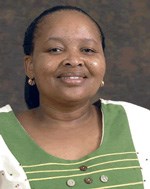Calls to make sign language official
The dream of people living with disabilities to have sign language added to South Africa's official language list might become a reality.
This follows people living with different disabilities making numerous requests to President Jacob Zuma during a Siyahlola Presidential Monitoring Programme in Nelspruit, Mpumalanga to have sign language declared an official language.
During a community meeting at Bergvlam Primary School, people with disabilities and various organisations urged Zuma to add sign language as one of the official languages.
Scelo Dlamini from KwaZulu-Natal's Deaf People Association told Zuma that the deaf sector suffered a lot in schools as they were being taught by teachers who did not know sign language.
"Please make sure that there's training for teachers for sign language, including in Early Childhood Development for deaf children to develop their language. Then they will know sign language better when they go to school," Dlamini urged the President.
A representative from South African Disability Alliance urged the Department of Basic Education to improve the use of sign language in schools.
"Deaf learners are still not being taught in the medium of sign language. Academic curriculum for deaf children and intellectual learners is unsatisfactory," he said.
In response, Zuma said it was clear that government needed to do something. He said the suggestion should be introduced to the lawmakers so that they can debate it.
"From today we can argue it better - whether in Parliament or Cabinet - to say that this must happen. Children with disabilities go to school and are taught by teachers who don't understand the language - you can imagine the difficulty," he questioned.
He said learning sign language should be included in teacher's training.
The visit by Zuma was a culmination of Disability Awareness Month held in November under the theme, "Removing barriers to create an inclusive and accessible society for all", as proclaimed by the United Nations for the International Day for Persons with Disability held on 3 December.
The President's visit focussed on issues of disability, where officials from various government departments monitored the progress made by the province in mainstreaming disability issues and the disability challenges facing the province, which is home to 133,333 persons with disabilities.
Responding to the challenges raised by people with Albinism, including being teased, Zuma urged South Africans to respect their rights and stop calling them names.
"There should be no more calling them by different names. Government must do something about that ... We have to respect the rights of all citizens, we might outlaw these names ... so that we can caution society and accord them the respect that they deserve," Zuma said.
The people with disabilities also called for government to ensure that departments fast track the implementation of 2% employment for people with disability as they also wanted to be part of the country's growing economy.
"We are going to try to enforce this 2%, I'm sure there must be a special programme that they can do to achieve that objective."
Zuma said since South Africa was now free, people with disabilities now had the right to stand up and express themselves.
"To me, this is an indication that freedom can do a lot for a nation. The fact that people with different types of disabilities are standing here, speaking for themselves is an indication that there's freedom in South Africa, there is respect for human rights," Zuma said.

(Image: GCIS)
Minister for Women, Children and People with Disabilities, Lulu Xingwana, said they had heard the concerns raised during the meeting and promised to do a follow up with Social Development Minister Bathabile Dlamini. She further committed to call other government departments to adhere to the 2% employment for people with disability.
"We already know the problems relating to access to transport and housing, and we are discussing these issues with relevant ministers including the Department of Labour.
"We will sit down and speak with the Arts and Culture Minister to recognise the issue of sign language. The Basic Education Minister heard all the issues regarding education and we will pass a request to the Health Minister about the access to hearing aids," Xingwana said.